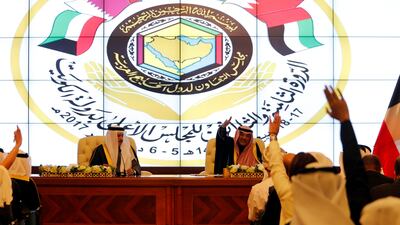Gulf Co-operation Council members will spare no effort to ensure the Middle East remains a nuclear weapons-free zone, even as countries begin exploring peaceful nuclear energy production, member states said on Monday.
The decision will require the “political will” of all members, they said.
Abdulaziz Al Wasil, Saudi Arabia's permanent representative to the UN, said the kingdom supports all efforts to ensure the Middle East remains free of nuclear weapons and said Riyadh would pursue “co-operation with the countries of the region to achieve that desired objective”.
He said the failure to achieve a nuclear weapons-free Middle East would pose an imminent threat to international and regional peace and security.
He also raised concerns about “clandestine” nuclear activities in the Middle East and nuclear facilities that are not controlled by the International Atomic Energy Agency (IAEA), referencing Israel's undeclared nuclear arsenal and Iran's enrichment activities.
“The continued Israeli nuclear facilities outside the scope of monitoring by the IAEA, as well as the other clandestine nuclear activities, necessitate that we ensure these are for peaceful purposes and this is a real concern,” Mr Al Wasil said.
Although it has refused to disclose its capabilities, Israel is believed to hold between 80 and 400 nuclear warheads and the capacity to produce plutonium for weapons purposes. It is also believed to have the capability to deliver nuclear strikes by air, submarine-launched cruise missiles and intercontinental ballistic missiles.
Middle East states have long called for Israel to open its nuclear facilities to IAEA inspectors and dismantle its arsenal.
Although Tehran has said it has no desire to build nuclear weapons, Iran is under heavy US and international sanctions for its advanced enrichment of uranium up to or close to weapons grade. This is well beyond the terms agreed in 2015 with world powers at the signing of the JCPOA nuclear agreement to limit enrichment to peaceful levels and restrict the quantities of enriched uranium Iran can hold.
Mr Al Wasil said all members must ensure the peaceful nature of all nuclear activities in the region as “a first step to achieving our primary objective” which is the establishment of a Middle East free zone.
The challenges facing the Middle East require concerted efforts to “de-escalate and build trust and express goodwill among all countries of the region” he said. This will ensure peaceful coexistence and achieve development and prosperity for all, he said.
GCC nations will continue to use nuclear energy peacefully in line with the aims of the UN’s landmark 1970 Non-Proliferation Treaty (NPT).
In 2021 the UAE's Barakah nuclear plant went online, becoming the Arab world's first nuclear power station. Since then, Saudi Arabia has announced plans to build a 2,800 megawatt nuclear power plant and Jordan is also looking into the feasibility of nuclear energy.





















